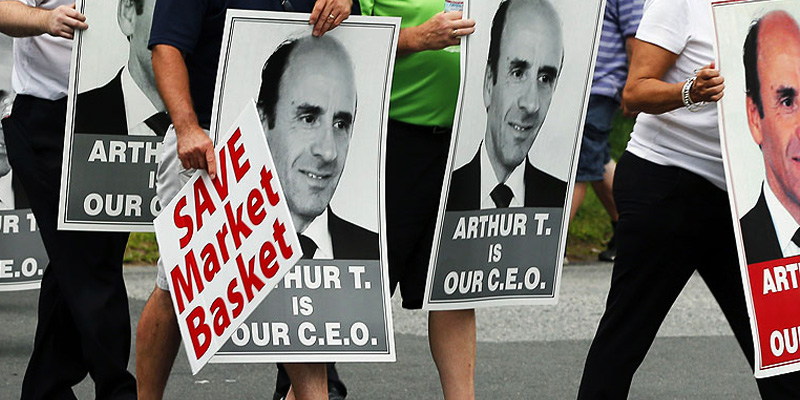Lessons in Loyalty from Market Basket’s “Artie T.”
| Adam Tiouririne | Bio | Posts 28 Aug 2014 | 4:09PM |
Watch out, Steve Jobs iPod keynote. There’s a new rival for the title of greatest speech in business history.
A decades-long family feud just ended with an unforgettable moment of public leadership.
This June, in a dramatic scene more reminiscent of a medieval legend than a grocery store, Arthur T. Demoulas was usurped as CEO of Massachusetts-based supermarket chain Market Basket. Artie T.’s own cousin, Arthur S. Demoulas, executed the coup, marking the nadir of a long-running squabble.
But it didn’t end there. Market Basket cashiers walked off the job, truck drivers stopped delivering, and customers took their business elsewhere. For weeks, crowds numbering as many as 15,000 demanded what they saw as the restoration of their rightful ruler.
The tumult took such a toll on Market Basket that Arthur S.’s handpicked new executive team mulled closing 61 of the chain’s 71 stores. But in the eleventh hour, as if riding atop a great white steed, King Arthur (Artie T., that is) returned to save the realm. His Excalibur, the peace-making weapon that ended the unrest, was a $1.5 billion offer to buy the shares of Arthur S. and his allies.
Then, in his first public appearance in years, Artie T. showed why he was worth fighting for.
Artie T. put the audience first and told a compelling story that focused on what matters.
We’ve seen plenty protests against CEOs, but Artie T.’s leadership was strong enough to inspire protest for a CEO. His speech shows how:
- Put the audience first: Artie T. puts his audience — Market Basket employees and customers — first. Last week I posted research about how American governors use pronouns, and perhaps they could all learn something from Artie T. He repeatedly calls Market Basket “your company” despite the share purchase that makes Market Basket literally, completely, absolutely his company. Almost every time he does refer to himself, it’s in order to make a favorable reference to the audience, such as “I am in awe of what you have all accomplished.” And in the closing crescendo, Artie T. goes plural: “Let’s move forward doing what we love to do: Working together and serving our devoted customers. We’ll get to work, and we’ll have lots of fun.”
- Tell a compelling story: Artie T.’s narrative casts his audience as devoted saviors, and recounts their trials in vivid language: “As you held signs in the hot summer sun, as you stood waving flags in the pouring rain, as you sacrificed your paychecks, as you shared your lunch with your fellow protesters, as you gave generously to those who had less than you, the public watched in awe and admiration.” And the tale includes a dash of humor, too. “Your grassroots effort … was not about a family conflict or a Greek tragedy,” the Greek-American says, winking to emphasize the joke.
- Focus on what matters: If there was any uncertainty about the purpose of the Market Basket uproar, Artie T. makes it clear: “You displayed to everyone your unwavering dedication and desire to protect the culture of your company. You have demonstrated that in this organization, here at Market Basket, everyone is special.” He hammers home the point again later, saying, “You empowered others to seek change. You … have demonstrated to the world that it is a person’s moral obligation and social responsibility to protect a culture which provides an honorable and a dignified place in which to work.”
But the speech was only possible because Artie T. started walking the talk a long time ago.
Thousands of people put their own jobs on the line to save Artie T.’s. That wouldn’t have happened if he hadn’t already built a deep reservoir of goodwill. The elements of an effective speech — putting the audience first, telling a compelling story, focusing on what matters — are also elements of effective leadership. Artie T. has never been perfect, but he walked the big-happy-family talk by getting to know customers personally, issuing quarterly bonuses to all employees, and paying entry-level workers 50% more than Massachusetts minimum wage. That’s why they all wanted him back.
Artie T.’s speech gave Market Basket employees and customers something to cheer about. It also gives leaders a lasting lesson in inspiring loyalty.
Share your thoughts here, like this post on LinkedIn, or tweet @Tiouririne.




Leave a Reply
Want to join the discussion?Feel free to contribute!